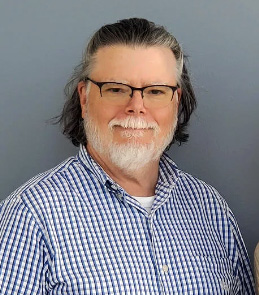Innovative Palliative Care Fellowship Program
CU offers online advanced training for mid-career providers
By Mark Couch
(May 2020) The University of Colorado School of Medicine is offering an innovative non-residential fellowship program to train physician specialists in hospice and palliative medicine.
Beginning this summer, six mid-career physicians will begin training in the Hospice and Palliative Medicine Fellowship demonstration project.
 “There is a serious and worsening shortage of palliative care specialists in all disciplines in healthcare, but the shortage of physicians is a particular difficult problem,” said Amos Bailey, MD, professor of medicine and director of the University of Colorado Master of Science in Palliative Care program.
“There is a serious and worsening shortage of palliative care specialists in all disciplines in healthcare, but the shortage of physicians is a particular difficult problem,” said Amos Bailey, MD, professor of medicine and director of the University of Colorado Master of Science in Palliative Care program.
“Currently, there are 360-380 physicians training to be hospice and palliative medicine specialists each year, but we need several times this number to meet the forecasted need with an aging population.”
Palliative care is provided by an interdisciplinary team that works with the patient, family caregiver, and medical providers to offer physical, social, emotional, and practical support, according to the National Institute on Aging. In palliative care, curative and disease-modifying treatments are provided and palliative care providers assist with symptom management and psycho-social-spiritual support to provide the best quality of life.
Over time, palliative care providers work with patient and families who may find that ongoing treatments are too burdensome with limited benefits. Some patients may transition to hospice care when that is consistent with their treatment preferences. Hospice is an approach that offers comprehensive comfort care to the patient and family in the final months of a life.
“We’ve found that physicians are often drawn to hospice and palliative care in mid-career, when they’ve witnessed how their patients and family caregivers could benefit,” Bailey said. “At this point in their professional careers, though, it is often difficult or even impossible to leave their family, community, and medical practice to relocate for advanced fellowship training in the critical discipline.”
As innovators in medical education, the University of Colorado Anschutz Medical Campus started the country’s first Master of Science degree program in palliative care in 2016. This interprofessional program enables physicians, nurses, advanced practice providers, social workers, spiritual care providers, psychologists, and others to advance their knowledge and skills through a primarily online format. The program participants attend three on-campus weekend intensive sessions that focus on communication training.
“This program has been ideal for mid-career providers because it allows them train as palliative care specialists while remaining in their home community and practice,” Bailey said.
Furman McDonald, MD, MPH, senior vice president for academic and medical affairs for the American Board of Internal Medicine, encouraged Bailey to develop an Advancing Innovation in Residency Education (AIRE) proposal that would allow physicians who complete the CU Master of Science in Palliative Care program to become board certified in Hospice and Palliative Medicine. Board certification provides a set of qualifications for practitioners and allows for oversight by peers who can ensure high standards of care.
Working with Eric Holmboe, MD, chief research, milestone development, and evaluation officer at the Accreditation Council for Graduate Medical Education, Bailey and the CU team developed a program of online hospice and palliative medicine seminars. They also created an online Palliative Medicine Clinical Portfolio which together with the existing Master of Science in Palliative Care degree course work will meet all Hospice and Palliative Medicine Fellowship requirements over a two-year period.
“This program, when successful, holds great promise as an alternative pathway for mid-career physicians to enter the field of hospice and palliative medicine,” Bailey said. “We have a growing workforce need. This model could also be used to support the development of specialists in other areas like geriatric medicine or addiction medicine where career development is necessary to provide the best care for patients, but is often impractical for providers who cannot forego professional and personal responsibilities in mid-life to relocate to another community for a residential fellowship program.”
Feature Stories
- Building Professional Resilience Through Creative Arts
- Model Hearts and Virtual Reality
- Improving Care for Colorado; CU School of Medicine expands access to care statewide
- New Clinic is ‘Bigger than What’s in These Four Walls’
- Innovative Palliative Care Fellowship Program
- Leadership, Curiosity, Commitment; School of Medicine updates curriculum for medical students
- Student Voice: The Gift of Gratitude
- Faculty Matters: What Every Doctor Should Know About the Holocaust
Profiles
- Searching For Cures to Lung Diseases
- Osseointegration surgery offers hope for better, faster, stronger life
- Building a Team, Not Just a Building; Hospital leader receives life-saving care after stroke at work